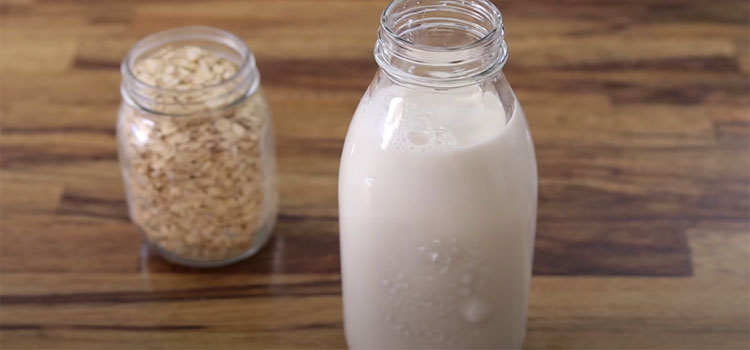Last Updated on September 15, 2024 by Shari Mason
A few months ago, a tasty oat milk latte made my day, but then something odd occurred. My throat became itchy, and hives appeared on my skin. This was puzzling since oats never caused any issues before.
Could I be allergic to oat milk but not oats?
Intrigued, I delved into the world of allergies to find some answers. Let’s explore this curious phenomenon together.
Is It Possible To Be Allergic To Oat Milk But Not Oats?


Yes. It is possible to be allergic to oat milk while tolerating oats. This intriguing phenomenon arises from creating oat milk [1], which involves blending and straining oats, altering their protein composition.
Consequently, individuals may develop an allergic response to the specific proteins present in oat milk while being able to consume oats in their natural form without any adverse effects.
The distinction highlights the complexity of allergies and the importance of understanding individual sensitivities when exploring alternative dairy-free options.
Read: Can You Use Oat Milk For Cereal?
Why Can Some People Consume Oats Without Any Issues?
When it comes to oats, it’s fascinating how some individuals can enjoy them without a hitch. The key lies in the intricate interplay of proteins, personal sensitivities, and immune responses.
“The truth is, for highly competitive bodybuilders, everyone eats the same – oatmeal, chicken, rice – and cuts carbs out at night.”
– Rich Piana, American Bodybuilder
In their natural form, oats contain proteins like avenins, which can trigger allergic reactions in specific individuals when modified during the oat milk-making process.
However, for those who can consume oats without issues, their immune system likely recognizes and tolerates these proteins, ensuring a smooth culinary experience.
It’s a reminder that our bodies, with their unique complexities, hold the power to navigate the world of food in ways that can sometimes perplex us.
But should you mix oat milk with cow’s milk?
Can Oat Milk Allergies Develop Over Time?


Allergies to oat milk can develop over time, even if you have previously enjoyed it without any issues. Allergies are unpredictable, and our immune systems can change throughout our lives.
While you may have once happily sipped oat milk lattes or poured it over your morning cereal, your body’s response to specific proteins in oat milk can shift.
“Like a chameleon hiding in plain sight, oat milk unveils a paradox: it tempts the taste buds while potentially stirring a hidden storm within. For some, the oats themselves bring comfort, but the transformed elixir of oat milk can provoke an unexpected battle with the immune system.”
– Eat Pallet Restaurant & Food Advice
So, it’s essential to pay attention to any new symptoms or reactions that arise after consuming oat milk, as it could indicate an evolving allergy.
Staying attuned to your body’s signals and seeking medical advice when necessary will help ensure your well-being and allow you to make informed choices about your diet.
But can you also use oat milk for instant pudding?
Common Symptoms Of Oat Milk Allergies
- Itching: Allergic reactions to oat milk can often trigger itching, which may be localized or spread across the body. Itchy skin is a common early sign accompanied by a tingling or prickling sensation.
- Hives: Oat milk allergies can cause the appearance of hives, also known as urticaria. These raised, red, or pale welts can be itchy and vary in size and shape. Hives can appear suddenly and disappear within a few hours or persist for days.
- Swelling: In some cases, oat milk allergies may lead to swelling, especially around the face, lips, tongue, or throat. This swelling, known as angioedema, can cause discomfort, difficulty swallowing, or breathing difficulties if the airway is affected.
- Nasal Congestion: Allergies can trigger nasal congestion [2], resulting in a stuffy or runny nose. This symptom may be accompanied by sneezing, itching in the nose, or a feeling of pressure in the sinus area.
- Coughing and Wheezing: Oat milk allergies can affect the respiratory system, leading to coughing and wheezing. These symptoms may be similar to those experienced by individuals with asthma and can cause chest tightness or shortness of breath.
- Digestive Distress: Some individuals may experience digestive symptoms such as abdominal pain, bloating, nausea, or diarrhea after consuming oat milk. These gastrointestinal issues can be bothersome and may indicate an allergic response.
- Anaphylaxis (Severe Reaction): Although rare, severe oat milk allergies can result in anaphylaxis, a potentially life-threatening allergic reaction. Anaphylaxis requires immediate medical attention and can involve symptoms like difficulty breathing, a rapid or weak pulse, dizziness, confusion, or loss of consciousness.
FAQs
u003cstrongu003eWhat alternatives exist for those allergic to oat milk?u003c/strongu003e
For individuals allergic to oat milk, various alternatives are available to meet their dietary needs. Common non-dairy alternatives include almond, soy, coconut, rice, and hemp milk. u003cbru003eu003cbru003eThese alternatives offer different flavor profiles and textures, allowing individuals to explore and find a suitable substitute that aligns with their preferences and dietary restrictions.
u003cstrongu003eWhat are the symptoms of oat milk contamination?u003c/strongu003e
Symptoms of oat milk contamination can vary depending on the specific contaminant involved. u003cbru003eu003cbru003eHowever, common symptoms may include gastrointestinal issues such as nausea, vomiting, diarrhea, and stomach pain. u003cbru003eu003cbru003eAdditionally, individuals may experience allergic reactions like itching, hives, swelling, or difficulty breathing if the contamination involves allergenic substances. u003cbru003eu003cbru003eIt’s essential to monitor for any unusual symptoms after consuming oat milk and seek medical attention if needed.
Key Takeaways
The intriguing answer to the question “Can you be allergic to oat milk but not oats?” is a resounding yes.
While oats are generally well-tolerated, creating oat milk can alter the proteins and potentially trigger allergic reactions in some individuals.
This fascinating phenomenon highlights the complexity of allergies and the importance of understanding personal sensitivities.
Suppose you suspect an allergy to oat milk. In that case, listening to your body, consulting with a healthcare professional, and exploring alternative non-dairy milk options that suit your dietary needs is crucial.
Remember, each person’s journey with food and allergies is unique, and with knowledge and awareness, you can navigate a delicious and allergen-safe culinary path.
References:
- https://www.healthline.com/nutrition/oat-milk
- https://www.mayoclinic.org/symptoms/nasal-congestion/basics/definition/sym-20050644
- Can You Put an AC Unit in the Kitchen? - September 27, 2024
- What Cheese Does Olive Garden Use? Discover Their Signature - September 27, 2024
- How to Cancel a Pizza Hut Order? Quick & Easy Guide - September 24, 2024


